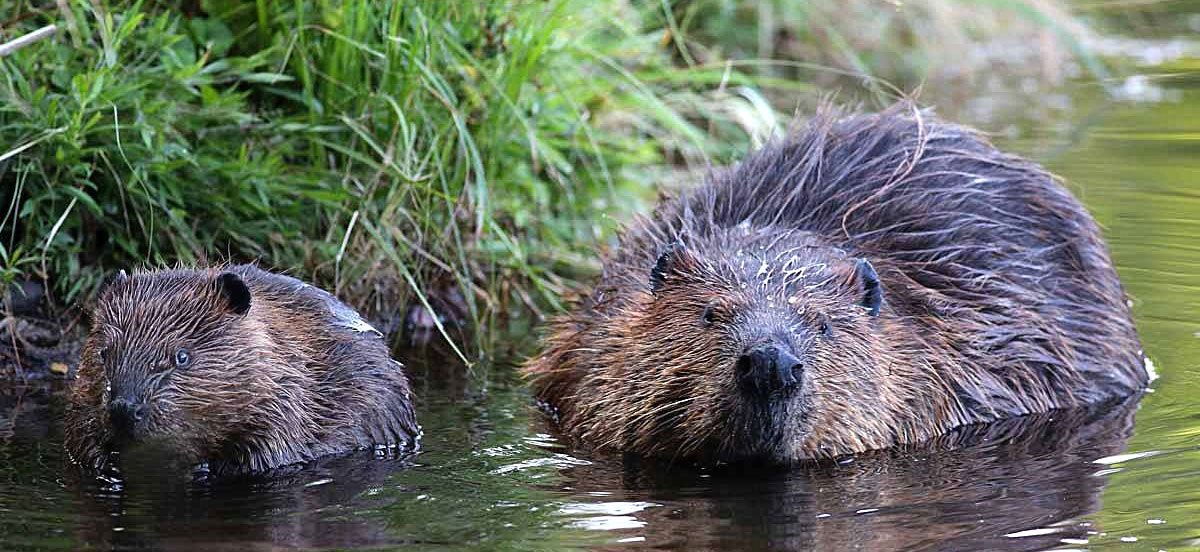Duxbury looks to address beaver conflicts with new policy
September 10, 2022 | By Cheryl Casey | Correspondent Beaver activity in Duxbury has prompted the town to adopt a new policy and to explore non-lethal steps it may take to thwart the animals that may cause damage to roads and property.
Beavers in a Vermont Department of Fish & Wildlife photo
The Duxbury Selectboard adopted a beaver control protocol at its August 22 meeting following resident complaints about how beaver mitigation had been handled this summer on private property.
In a letter to the Selectboard dated July 9, Emmett Hughlett of Marshall Road stated that he gave a contract hunter hired by the town permission to take one beaver from the pond on his property. Beaver activity at Hughlett’s pond had been identified as contributing to blockage of a nearby culvert.
According to Hughlett’s letter, the contract hunter shot three beavers on the property and drained two ponds in the process, which Hughlett claimed “violated our agreement, caused damage to the wetlands, and therefore was trespassing on my property.”
Hughlett concluded: “I revoke all permission to the town or its agent(s) to hunt or trap on my property indefinitely.”
Further inquiry by the Selectboard confirmed that four beavers had been killed on the day in question, three on Hughlett’s property and one on the adjacent property of Chuck and Carleen Ashley.
In letters to each of the property owners, the Selectboard apologized for the actions and acknowledged “an immediate moratorium on any actions related to beavers by the road crew” as they pursued creating a beaver management policy “to prevent, avoid and mitigate human-beaver conflicts on our town roads. Central to this policy is the principle of exploring all reasonable non-lethal means first. We invite your input into this policy,” the board said.
Any future action regarding beavers would require approval by the Selectboard and landowner permission “specifying in writing the number, timing and manner in which beavers may be taken from private property,” the board told property owners.
The new beaver control protocol requires a Selectboard decision, made with recommendations from relevant wildlife and road experts, before any actions to limit or stop beaver activity may be taken. Proposed actions will be expected to prioritize non-lethal options in mitigating the threat to town infrastructure or public safety.
The protocol also identifies several options for non-lethal beaver control, including wire fencing, culvert fences, beaver baffles, and water control structures, often referred to as “beaver deceivers.”
According to the Vermont Department of Fish & Wildlife’s public information about best management practices for human-beaver conflicts, there are three types of problems, each of which is addressed by particular state law and recommended actions for prioritizing non-lethal solutions.
Type 1 is beaver damage to the landscape, including ornamental trees and shrubs. Type 2 refers to culverts and dams less than two years old that have been obstructed by beaver activity. Type 3 addressed established beaver dams (more than two years old) that have come to pose a hazard to infrastructure or human safety.
In an email responding to an inquiry from Waterbury Roundabout, Duxbury Selectboard Chair Mari Pratt said that town officials are getting a better understanding of the issue. “As a board I think we are more aware of the different ways beavers can damage our roads. It is not always just a culvert being blocked. Sometimes it is how fast they can build a new dam that starts water backing up in a new place,” she wrote.
Selectboard members are taking the coming weeks to gather more information about the installation of beaver deceivers, with Marshall Road being a priority focus. According to Pratt, “We did find out that the baffle we were hoping would help with our most immediate need is not recommended” by the experts they have consulted, including Fish & Wildlife staff. However, “when things start going toward the roads and the residents call because of that concern, we need to act. The new policy gives us a direction to move,” Pratt added.
The Selectboard said it would discuss the issue further including specific actions the town may take to address beaver activity at its Sept. 26 meeting.
The policy comes at a crucial time, since the town has been developing a long-overdue highway improvement plan that will necessarily affect the wildlife ecosystem.
“After talking with our road crew we were enlightened with a total of five beaver areas that can damage our infrastructure,” Pratt said. “How will this reflect on the road improvement plan... until we figure out how we want to address the beavers of Duxbury, we really will not know,” she admitted.

